
The challenges of pursuing and securing an academic position in Communication can be overwhelming. NCA's Career Center provides a range of data and materials about the contemporary academic job market and advice and resources for those engaged in the job search process.
![]()
The academic job market is complicated and ever-changing. NCA has gathered data, information, and resources about the academic job market generally and the job market in Communication specifically, to assist job seekers and job providers. Here you'll find information about the number of Ph.D.s produced in Communication, data about job positions in Communication, tenure-track vs. non tenure-track academic positions, academic salaries, and resources and other information sources.
Number of Ph.D.s Produced in Communication
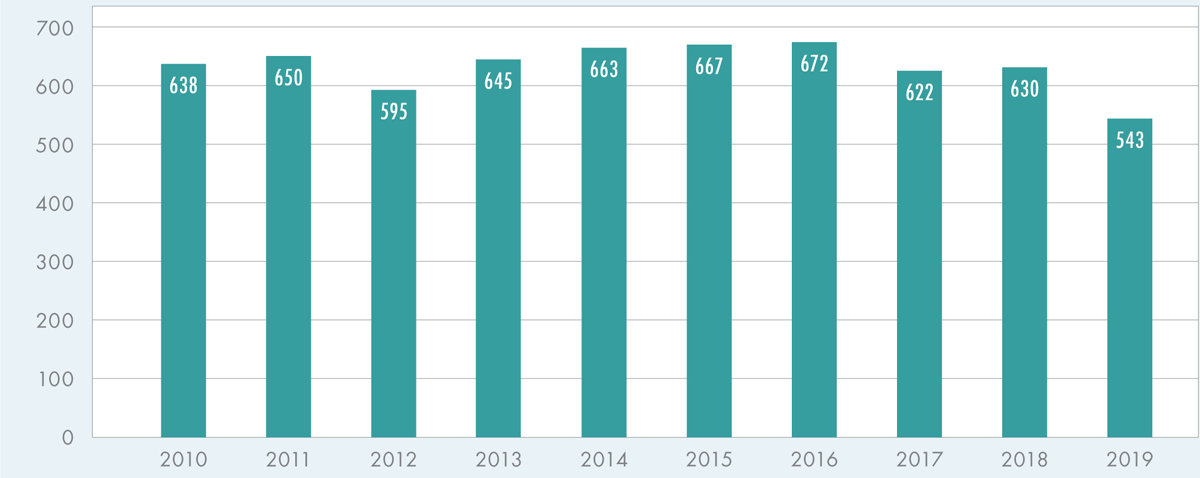
Source: NSF, 2018 SED - From the National Science Foundation's Survey of Earned Doctorates. The NSF reports separate figures for earned doctorates in Communication (including the subcategories of Communication Research, Communication Theory, Mass Communication/Media Studies, Film/Radio/TV/Digital Media, and Communication/General).
Job Positions Data
NCA annually tracks the job postings submitted to COMMNotes, the NCA online Career Center, and NCA's online magazine Spectra. The chart below reports the total number of job postings by year for 2009-2021. The figures reported are for discrete job postings and control for duplication.
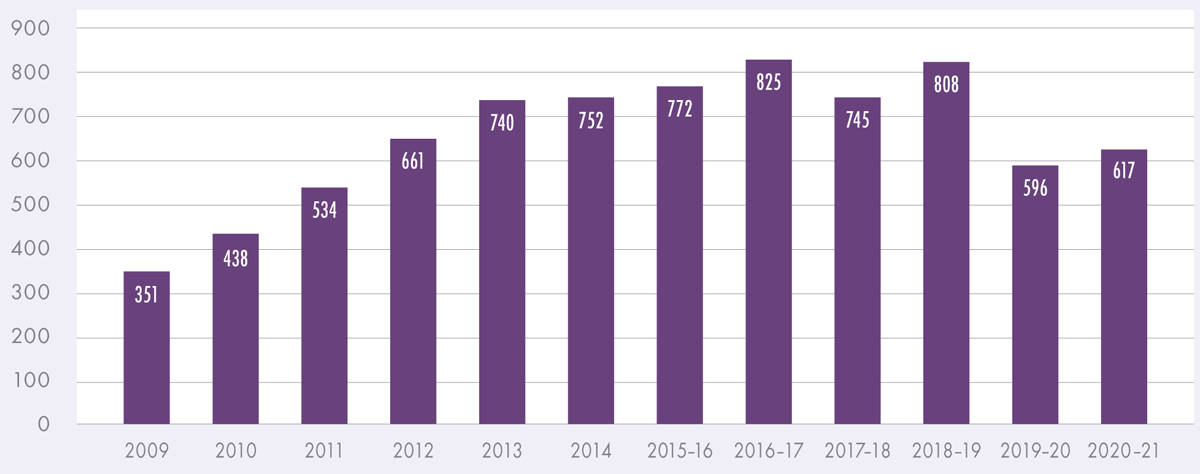
NCA conducts extensive analyses of job postings in Communication. NCA also reports on job listings data each year:
- 2020-2021 Academic Job Listings in Communication Report
- 2019-2020 Academic Job Listings in Communication Report
- 2018-2019 Academic Job Listings in Communication Report
- 2017-2018 Academic Job Listings in Communication Report
- 2016-2017 Academic Job Listings in Communication Report
- 2015 Academic Job Listings in Communication Report
- 2014 Academic Job Listings in Communication Report
- 2013 Academic Job Listings in Communication Report
There is much discussion in the news media and elsewhere about the decline in academic jobs across the humanities and social sciences. NCA has analyzed the job postings data from several related disciplines to determine how the Communication job market compares:
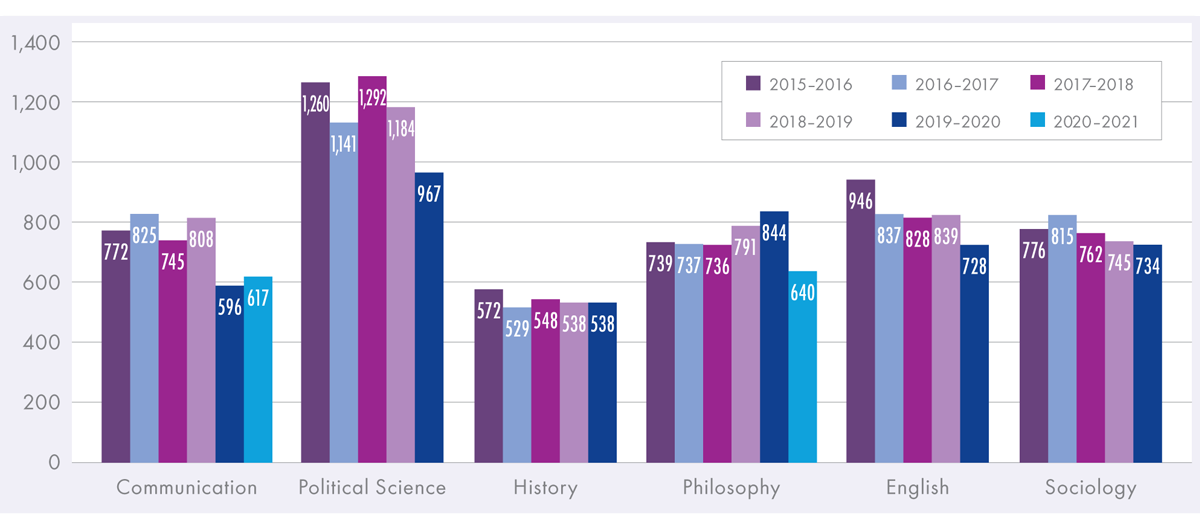
The U.S. Department of Labor’s Bureau of Labor Statistics also maintains employment data for numerous sectors of the economy, including “Communications Teachers, Postsecondary." This employment category includes individuals who “teach courses in communications, such as organizational communications, public relations, radio/television broadcasting, and journalism. Includes both teachers primarily engaged in teaching and those who do a combination of teaching and research.”
- Number of individuals employed nationally in this category, May 2020: 28,430
- Mean annual wage, May 2020: $80,940
- Individuals employed in College, Universities, and Professional Schools, May 2020: 20,990
- Individuals employed in Junior Colleges, May 2020: 7,370
- Top five states for postsecondary Communications Teachers employment, May 2020: New York, Texas, California, Illinois, and Pennsylvania
- Top five metropolitan areas for postsecondary Communications Teachers employment, May 2020: New York, Chicago, Los Angeles, Philadelphia, and Washington, DC
Tenure-Track vs. Non Tenure-Track Teaching
The NCA 2020-2021 Academic Job Listings in Communication Report shows that 44 percent of the 2020-2021 job postings sought individuals for tenured or tenure track positions. The largest number of position postings were for assistant professor positions. During the 2020–2021 academic year, 18 percent of positions posted were for non-academic positions.
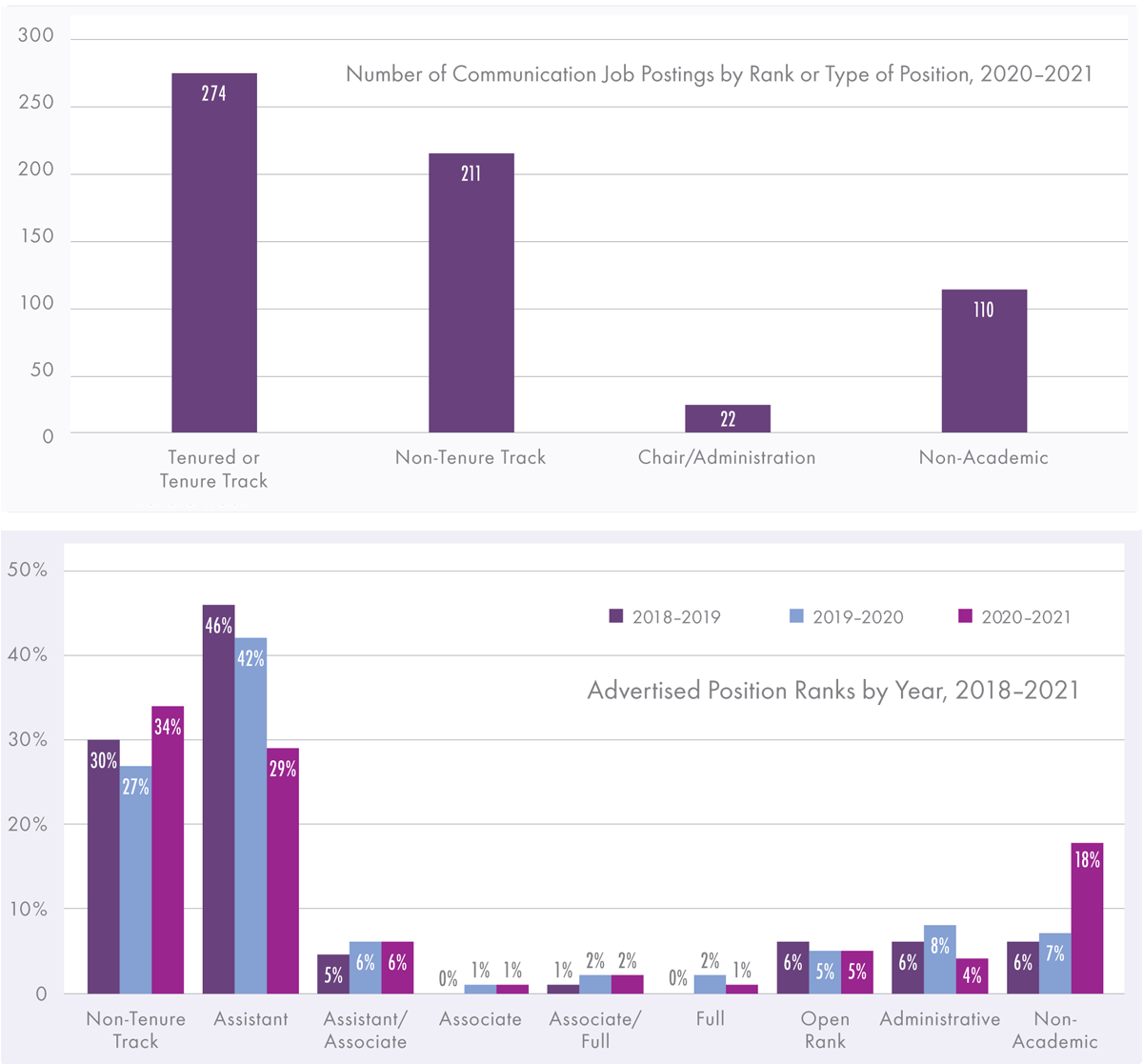
Resources
- “A Very Stable and Secure Position?,” Inside Higher Ed, April 30, 2020.
- “AAUP Contingent Faculty in US Higher Ed, 2018”
- American Association of University Professors
- American Association of University Professors, “Contingent Faculty and the Global Pandemic,” 2020.
- The Coalition on the Academic Workforce, “Research and Reports”
- Aubrey A. Huber (2020) Failing at the help desk: performing online teacher, Communication Education, 69:4, 464-479, DOI: 10.1080/03634523.2020.1803379
- “Communication Faculty Job Market Continues to Recover,” Inside Higher Ed, October, 2019.
- Steve Street, Maria Maisto, Esther Merves, & Gary Rhoades, “Who is Professor ‘Staff’: And How can this Person Teach So Many Classes?” Center for the Future of Higher Education, August 2012.
Academic Salaries
NCA’s November 2019 Spectra issue, “The State of the Communication Discipline,” presented data on five aspects of the Communication discipline: Departments and Programs, Faculty in Communication, Undergraduate Students in Communication, Graduate Students in Communication, and Communication Scholarship. The issue reported on data from the Bureau of Labor Statistics (BLS) about postsecondary Communication teachers. The chart below compares postsecondary teacher salaries in Communication and similar disciplines, using 2018 data from the BLS.
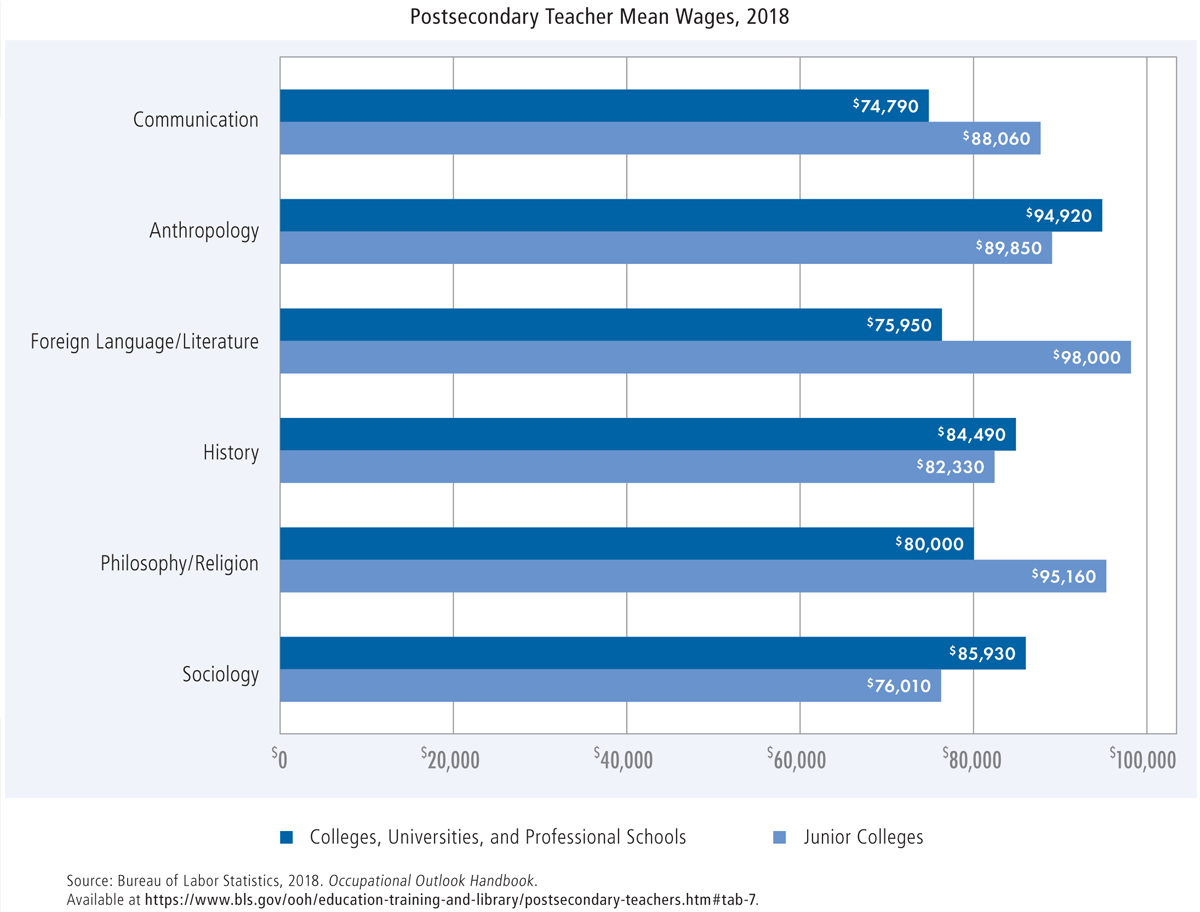
The issue also included data from the 2019 College and University Professional Association for Human Resources’ (CUPA-HR) Faculty in Higher Education Annual Report. The report indicated that faculty salaries for all disciplines had increased by an average of 1.73 percent in the three years preceding the report. The charts below break down the average salaries for tenure-track and non-tenure-track positions at different types of institutions.
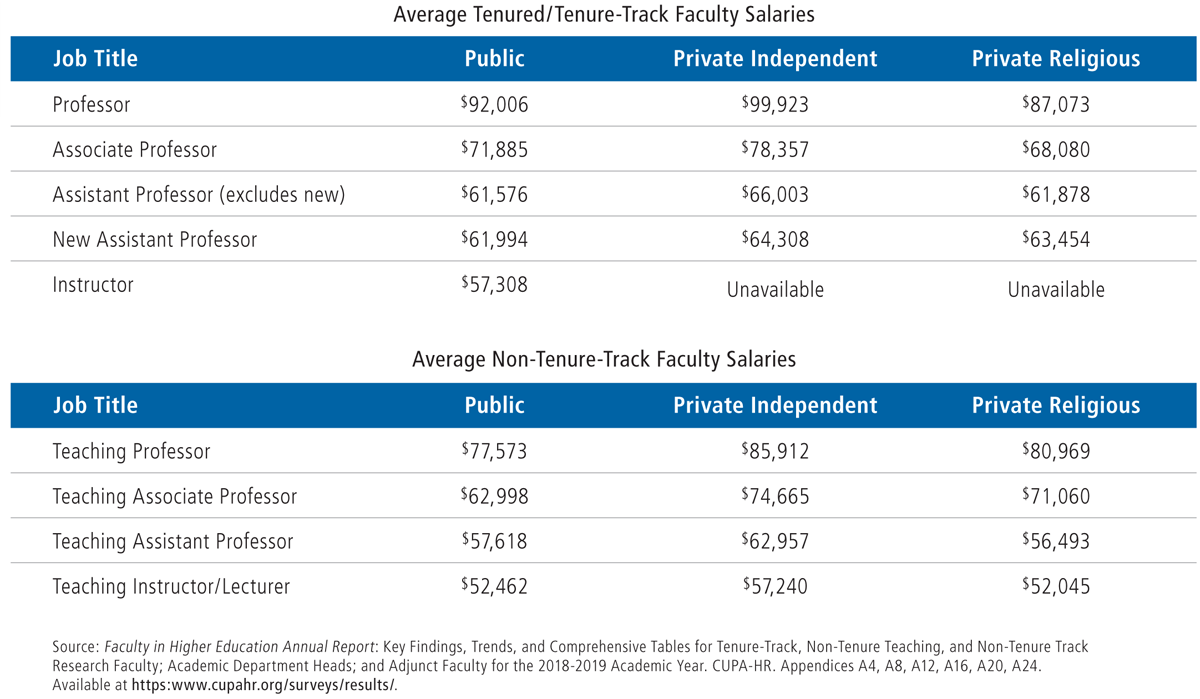
Resources
- “The Almanac of Higher Education,” The Chronicle of Higher Education.
- Stephen J. Aguilar, “Yes, You Should Negotiate,” Inside Higher Ed, March 13, 2019.
- “Great Colleges to Work For”
- Colleen Flaherty, “Professor Pay Is Flat -- Again,” Inside Higher Ed, April 8, 2020.
- “Presidents’ Pay Compared To Faculty Salaries At Top Public Universities,” Forbes.
NCA Prep Talks
NCA compiles tools and resources to support your career development, whether you are just starting out in academia or a seasoned scholar looking for new opportunities. Department heads, experienced job seekers, and employers offer insights and expertise on the hiring process, including tips for CVs and cover letters, interviewing techniques, and related information. In addition, tenured faculty offer advice for professional development. These are the three most recent PrepTalks from the NCA Annual Convention. Below you'll find past PrepTalks on a variety of topics.
- Beyond the Ivory Tower: An exploration of Alt-Ac careers, Kimberly D. Osborne, Defense Language Institute Foreign Language Center (2020)
- Navigating the Job Market during a Challenging Time, Joseph Mazer, Clemson University (2020)
- DEI: The Call to Task BEFORE You Start the Job, Kami J. Anderson, Kennesaw State University (2020)
- Stand Out and Survive the Academic Job Interview for Non-Academics - Stacy Smulowitz, University of Scranton (2019)
- Presenting Your Best Self: Elevator Speeches for the Academic Job Market - Jade Olson, University of Maryland (2019)
- Writing and Maintaining an Academic CV - Vinita Agarwal, Salisbury University (2019)
- How to Play Your Cards Right: Lessons in Professionalism, Poise, and Probity - Nelle Bedner, University of Central Arkansas (2018)
- Telling your Story: The Research Talk and Teaching Demonstration - Mattea A. Garcia, Rollins College (2018)
- Recognizing, Evaluating, & Presenting Academic Skillsets to a Non-Academic Audience - Sarah McGhee, Association of American Medical Colleges (2018)
- Acing the Academic Interview: Strategies for Face-to-Face, Digital, and Phone Interviews - Dr. Peter Jorgensen (2017)
- Securing a Job Abroad: Exploring Academic Opportunities Outside the U.S. - Dr. Allison L. Eden (2017)
- Translating Professional Experience to the Academy: Strategies for Job Seekers and Current Faculty - Dr. Stacy Smulowitz (2017)
- How to Talk Yourself Into a Job: Nailing the "Job Talk" Experience - Dr. Peter Jorgensen (2016)
- The Academic Job Market in Communication: On Campus and Beyond - Dr. LaKesha Anderson (2016)
- Avoiding Land Mines when Interviewing with Administrators - Sue DeWine, Hanover College (2016)
- Interviewing with Insight: How to Anticipate Interview Questions and Formulate Meaningful Responses - Dr. Claire Procopio (2015)
- Embracing Opportunities Beyond the Academy - Dr. Elizabeth Baiocchi-Wagner (2015)
Insights and expertise on the hiring process:
- How to Write a CV--The Professor Is In
- How to Write a Cover Letter--The Professor Is In
- Non-Academic Career Options for PhDs in the Humanities and Social Sciences - Columbia University Center for Career Education
- The Academic Interview: Handling Difficult Questions
- The Academic Job Interview: Handling Difficult Moments
- The Academic Interview: Tips for Success
- Questions to Ask When Receiving an Academic Position Offer
- Preparing for the NCA Job Fair
- The Elevator Pitch
Getting the Most from Your Graduate Education in Communication: A Student’s Handbook
More than 35 Communication scholars lend their insight and advice to this graduate school survival guide. Featuring chapters on finding the right program, completing your thesis, getting published, and finding your first job, this handbook is a must for anyone considering pursuing a graduate degree in Communication.
Professional Development During Your Doctoral Education
This informal introduction to professional development is designed for doctoral students in Communication. Addressing several issues involved with career development, the booklet is a primer to graduate school and helps one prepare for conversations and questions with faculty throughout one’s graduate education.

